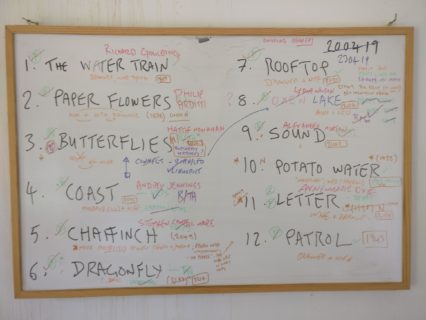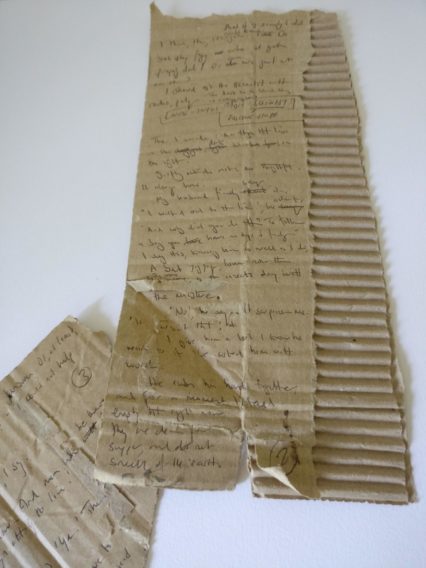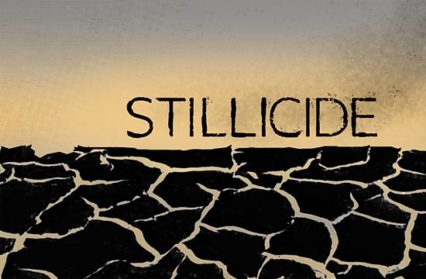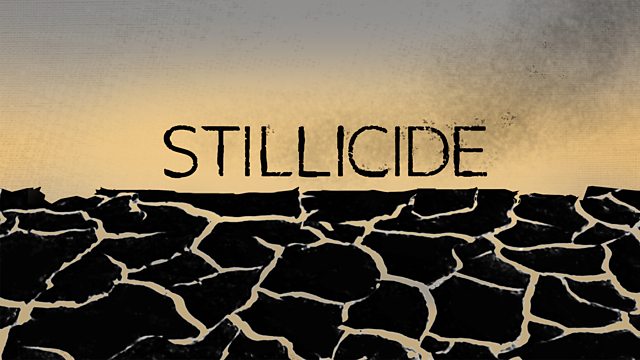Cynan Jones charts the journey of his new work for BBC Radio Four, Stillicide, a tough collection of dystopian stories that tell of a future Britain fighting for water.
Stillicide is a commission. I was speaking at Cambridge alongside Di Spiers, Books Editor at BBC Radio 4. She asked me to pitch an idea that would deliver twelve separate but interconnected stories, each fifteen minutes long, to air through the summer and into the autumn of 2019. This format had worked the two preceding years with story series from Jon McGregor (The Reservoir Tapes) and David Szalay (Turbulence).
I guess Di thought I’d come back with an idea set in a close Welsh community. Something agricultural, at least. Or perhaps an idea grown out of Welsh myth. However, I already had an idea simmering. One that, from the start, I envisaged would play out through separate stories that gradually drop together to present a wider whole. It was set in the tangible future and centred on the commodification of water. She loved it.
The commission got the greenlight in September, and I took the rest of the month to shore up some work in progress. In October I jumped onto Stillicide. The BBC wanted first drafts by January. This effectively meant writing a new story a week for three months.
I’ve spoken a lot about the approach I usually adopt to writing. Think it all through first, make notes, do research. Wait until I can see the story in my head, then write it down as if I’m watching it. This time, I didn’t have that luxury.
The RLF post at Aberystwyth Uni took up two days a week. I had a 9-month-old baby. I’d already committed to a significant amount of other writing work and travel. Rather than disappear down a rabbit hole, I decided to up the pressure and give only three weekdays over to Stillicide. I also decided I would move to a different story each week, regardless what shape they were in after the three days’ work. Ultimately, I thought, I can make them better later. The big thing was to generate twelve stories and see if the overall narrative held.
I got on with it.
By Christmas I had more than a dozen pieces strong enough to make a case for themselves. Granta had come on board to publish the collection after the series aired but I determined to stay true to the original remit. These were stories to be read out on radio. The stories had to be direct and present a complete world in under 2,000 words. An actor, with the input of the series producer Justine Willett, would bring their own take to the text. Music and sound would contribute to the effect. These considerations fed into the choice of stories and how those stories were written.
I sent the chosen dozen in.
When you take on a commission you take on the parameters set by the people paying you. You accept that from the start. You also know those people will expect to have input as the work develops. I made it clear to Di and Justine that I understood this and asked they be blunt if something didn’t suit. I also underlined the fact the stories were in draft, necessarily loose in places, and that at this stage stuff could change. My plan was to remain flexible until I got the thumbs up across the series, to settle on a dozen, then nail everything solidly into place.
Justine and Di came back to me with a clear response. They were delighted with the way things were shaping up but, of course, this was early days and they had concerns.
They wanted the characters to have names. They also needed more clarity in some of the stories. Bluntly, this meant adding ‘he said, she said’ in places; it meant outlining ‘why this situation is happening’; explaining ‘why water is scarce’. Stuff I usually resist. However, I took it all on board. Listeners didn’t get to turn back a page and check a detail. I was presenting a big world here, and it needed more signposting.
Some of the material, too, was simply too raw. The stories, I found out during the writing, would be broadcast at 7.45 p.m. on a Sunday. Some of the necessarily more brutal aspects in one or two of the stories would not fit.
I was fine with this. The overriding approach to the commission was a pragmatic one. If people, (including Laura, now, my editor at Granta), were going to see work in progress, that would affect the direction of that progress.
I went back to the desk. If I felt rewriting a story took it too far from what it wanted to be, I scrapped it and wrote another one instead. Cutting to the chase, I spent February and March rewriting, or switching in new stories, and tweaking to bring a balance across the collection.
As things developed, what changed most was the feel of the overall narrative. It morphed from one that described a denouement, to one that set up an ongoing situation.
Material went back and forth.

I agreed to drop mention of a breaking communications technology scandal that ran through the pieces. Apparently, Radio 4 listeners wouldn’t like the suggestion mobile phones might not be so great. Similarly, I agreed to cut implications that windfarms might be difficult to live near. The story of ex hill famers turned scrap men, now nomadically clearing the hills of derelict turbines, was removed. There shouldn’t be any suggestion that the BBC might not be in favour of alternative energy.
I could live with these cuts, but there were certain things I didn’t budge on. I resisted the request to give the piece a definitive date. A ‘when, exactly.’ It was important to have ambiguity here. The world of Stillicide needed to feel in some ways familiar and tangible. A world we could very easily get to (and in certain respects, have). It is not a dystopia, despite the tag that has inevitably been applied. Dystopian horrors happen today, and I’m pretty sure dystopian horrors happened in Roman Britain. But society gets on with things. That was the important point to transmit.
I also resisted pressure to Brexitise the series. To give some indication ‘where this future Britain’s place was within Europe.’ Similarly, I declined encouragement to ‘make more of the North South divide’. It was fairly clear there was the city and there was outside the city. I didn’t see that as a North South issue. Equally, I didn’t want to demonise the city in the way of many future stories. There had to be love and invention and colour there too.
The main headbutting contest was over the title. Both the BBC and Granta urged me to drop “Stillicide” on the basis no-one knew what the word meant. To me, in the way it informs the narrative structure, in the way it sounds at the same time archaic and futuristic, and in the way people guess it must refer to some sort of killing off, the word does huge work and I’m glad I stuck to my guns.
In most other cases though, I stayed flexible until I got the go ahead with twelve stories that answered the call of the commission. By this point, entering April, pressure was on to finalise a manuscript for print. While the radio pieces could be changed even at the point of recording or final editing, the book text needed to be signed off.
There was, of course, an option to change the stories for the page, but that would do the commission a disservice. However, the book does keep the original opening sequences that were in turn too brutal and too abstract for Sunday evening radio. In keeping these, the book maintains an ellipse that couldn’t happen on radio, and this strongly adjusts the focus of power in the narrative.
The only other major difference between the two formats is that one story, ‘Potato Water’, is shorter in the book.

I wrote it in one draft, and it resisted change. I continually tried to make the story long enough to fill the fifteen-minute slot, but nothing I did was quite right. Laura felt the piece worked as it stood – in fact, it was her favourite of the collection – and as the print deadline fell, we went with it. I continued to struggle to bring the piece to radio length, but (unlike with several other stories) something persuaded me not to abandon it completely and slot in something new.
I was out late in the garden, on my third Negroni, watching bats flicking as the light fell. I scribbled a note on an old receipt. Then I started writing on strips I tore from the cardboard that lined the chair I was sitting on. I never write this way, but there it was. The radio draft.
I hit the May deadline for delivery to Radio 4. It was over to them.
The story scripts were finalised to fit the timeslot. In some cases, further material was trimmed away and, where something remained too difficult to transmit on one hearing, or a reference required knowledge most listeners would not have, the texts were tweaked accordingly. The term ‘tweak’ was by now a pleasant in-joke.
The stories did great work drawing together an excellent cast of readers. I was lucky enough to be at the studio to hear two of them read. Seeing the process helped me understand just how difficult it is to simply ‘read a story out loud’. They weren’t ‘acting’ these. This commission came out of the short story budget and shouldn’t stray into drama.
While being present at the recording sessions gave me some idea how these two readers would sound on air, I don’t hear the final pieces until broadcast. At the time of writing, we’re halfway through the series.
Stillicide – some are calling a novel in stories – is published as a book on October 17th. It seems to have come around quickly, through a blur of distractions, both good and bad. I guess that’s the thing with the future though.
Stillicide is available on BBC Sounds. The books was published by Granta.
More of Wales Arts Reviews’ features on Cynan Jones can be found here.













